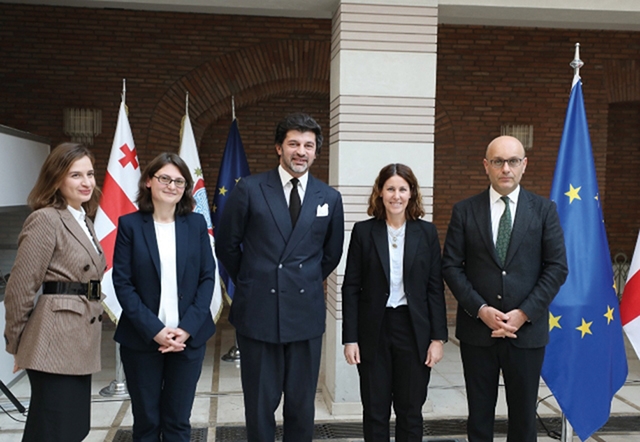EBRD for Georgia’s Public Transport Development
On November 29, Georgian Finance Minister Ivane Matchavariani, Tbilisi City Mayor Kakha Kaladze and EBRD (European Bank for Reconstruction and Development) Regional Director in the Caucasus Catarina Bjorlin Hansen signed a contract to ensure that Tbilisi will get approximately 200 new ecologically clean CNG (Compressed Natural Gas) buses.
The abovementioned project is a continuation of the 2016 contract signed with the EBRD, which is to provide a sovereign loan of 80 million Euros, 65 of which will be used to purchase buses and the remaining 15 million to fund the construction of a bus depot. The project carries environmental, protectoral and social significance. The investment will improve the reliability, safety and efficiency of public transport, and the modern CNG technology will reduce greenhouse gas emissions. The project will introduce low-floor buses, bringing significant social benefits by facilitating easy access for passengers with prams and shopping bags, especially women, and those with limited movement, including the elderly and the disabled. Moreover, the new buses will improve the safety of bus operations.
“The project will finance a new bus fleet of modern 12-meter low-floor CNG buses and the rehabilitation/modernization of bus depots for the city,” reports the EBRD.
It is noteworthy to say that in 2016, within the frames of the EBRD project, Tbilisi was supplied with 143 ecologically more sustainable buses that run on gas.
Matchavariani and Hansen further signed the ‘Urban Transport Development Program for Georgia’ agreement. Within the frames of this project, the EBRD will provide 17 million Euros of sovereign loans to Georgian state that will be on-lent to the Municipal Development Fund of Georgia. The program is aiming for the development of public transportation in 6 big cities of Georgia. ‘Urban Transport Development Programme for Georgia’ will supply Kutaisi, Rustavi, Zugdidi, Telavi, Gori, and Poti with 175 new buses.
“The project is part of the Bank’s broader engagement in Georgia’s public transport sector, with investments tailored to the needs of cities to support reforms and achieve sustainable operations with low-emission technology.
Replacing the outdated bus fleet with modern low-floor, low-entry buses is expected to have a considerable environmental and social impact. With the new Euro 5 diesel buses, emissions should be reduced by 34%,” reports the EBRD.
Simultaneously, the Ministry of Finance of Georgia reports that the EBRD is ready to start looking for funds to do related research on current necessities (bus routes, paying systems, etc.) in these municipalities.
The ‘Urban Transport Development Program for Georgia’ will stimulate the development of the region, the quality of serving the population, and the level of safety when using the public transportation.
Georgia has been a member of the EBRD since 1992. Since then, the European Bank has launched 198 projects in Georgia, all of them successfully contributing to the country’s developing process. The Bank has invested €3,466 million in Georgia’s projects, making it the leading institutional investor in the country. The EBRD has a clear direction of focus in Georgia, to wit: “In Georgia we focus on supporting private sector competitiveness through innovation, developing local currency and capital markets, expanding markets through inter-regional connectivity, and renewable energy, resource efficiency and climate change adaptation.”
By Nini Dakhundaridze
Image source: The Ministry of Foreign Affairs of Georgia











